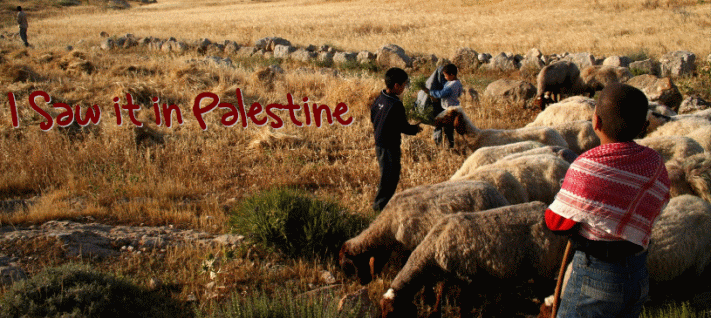Friday, February 27, 2009
The video documents Israeli army harassment of local Palestinians as well as the soldiers' dismaying attitude toward the widespread killing of Palestinian civilians in Gaza. A soldier says, in full view of the camera, that the children killed in Gaza "will be terrorists in about 20 years anyway."
This video documents an incident of Israeli army harassment in the village of Mufaqara. (see At-Tuwani Release: Soldiers Kill Palestinian Migrant Worker, Increase Harassment of Villagers in South Hebron Hills, February 12, 2009). Mufaqara is a Palestinian village in the South Hebron Hills in the occupied West Bank. I'll stop here - I know the people in this video and it's very difficult to watch.
Tuesday, February 24, 2009
“It’s hard for anyone in our country to imagine how it must feel to have a sick child who needs urgent care or is receiving chemotherapy or dialysis, then be forced to take a needlessly lengthy route, walk rather than drive, and wait in lines as long as two hours simply to get to the hospital. As a health care professional myself, I found this profoundly troubling, no, actually it’s beyond that, it is outrageous”Those are the words of my congressional representative, Brian Baird (WA, D). Along with Keith Ellison, Baird just visited Gaza and come with what seems to be a genuine commitment to speaking out about what he witnessed. Honestly, after spending *years* lobbying this man, imploring him to speak out, I'm pretty excited. Rachel Corrie's mother and father, Craig and Cindy, deserve a lot of credit, I believe, for bring Gaza to Baird's attention. And you have to admit, it does take some courage for him to take this stance.
Baird reports seeing terrible and disturbing things in Gaza:
“The amount of physical destruction and the depth of human suffering here is staggering” said Baird, “Entire neighborhoods have been destroyed, schools completely leveled, fundamental water, sewer, and electricity facilities hit and relief agencies heavily damaged. The personal stories of children being killed in their homes or schools, entire families wiped out, and relief workers prevented from evacuating the wounded are heart wrenching – what went on here, and what is continuing to go on, is shocking and troubling beyond words.”
The rest of the press release Ellison and Braid released is here and you can read more about their trip in the Jerusalem Post (be mindful of how right wing that paper is, by Israeli standards). If you have a moment, Baird and Ellison (and John Kerry who also just visited Gaza) emails and ask them to keep speaking out. You know they're going to be criticized for this.
Friday, February 13, 2009
AT-TUWANI: Soldiers kill Palestinian migrant worker, increase harassment of villagers in South Hebron Hills
CPTnet
12 February 2009 Three incidents in recent days indicate that Israeli occupation authorities are stepping up their aggression in the South Hebron Hills, particularly in response to Palestinian migrant laborers.
Three incidents in recent days indicate that Israeli occupation authorities are stepping up their aggression in the South Hebron Hills, particularly in response to Palestinian migrant laborers.
On the morning of Monday, 2 February, Israeli soldiers shot dead a Palestinian man on the Israeli side of the border near the Palestinian village of Jinba and the Israeli settlement of Beit Yatir. Taysir Manasra, 27, from the Hebron-area village of Bani Na'im, was attempting to travel into Israel for work.
CPTers, along with other human rights workers, arrived on the scene at 1:30 pm to find a bullet-riddled car, a puddle of blood, and soldiers and police detaining about ten Palestinian men. A corpse had just been removed from the scene.
Other Palestinian migrants told the internationals that they had already been detained when Manasra drove his car through an army ambush. The soldiers ordered them to lie facedown before they shot at Manasra's car and killed him.
Under Israeli law it is illegal for Palestinians to cross the 1949 Green Line (the internationally recognized border between Israel and the Occupied Palestinian Territories) without a permit, which is extremely difficult to obtain. Along part of the West Bank's border near the Israeli town of Be'er Sheva, the barrier is not yet completed. At-Tuwani, five km north of the border, lies directly on the primary route traveled by Palestinian workers. (For a map of this area see http://tinyurl.com/bt629r.)
The same morning, Israeli soldiers set up a checkpoint on the Palestinian road from at-Tuwani to al-Birkeh. They stopped two Palestinian vehicles, removing and physically assaulting the drivers.
The other man transports Palestinian schoolchildren daily between at-Tuwani and the village of Susiya (three km southwest). He also showed the soldiers valid papers. One of the soldiers grabbed and struck him repeatedly on the face and upper body, before letting him go.
The following day, 3 February, Israeli soldiers arrested a Palestinian at his home in Mfagara, one km southwest of at-Tuwani. They claimed that the van parked outside his home was not correctly registered. CPTers videotaped him as he showed the soldiers his documents, which they confiscated. The man, a well-known local peace activist, calmly agreed to go with the soldiers in order to settle the dispute. The soldiers handcuffed him, placed a black hood over his head, and drove him away in an army humvee.
For images of these incidents, go to http://tinyurl.com/cgkqll.


